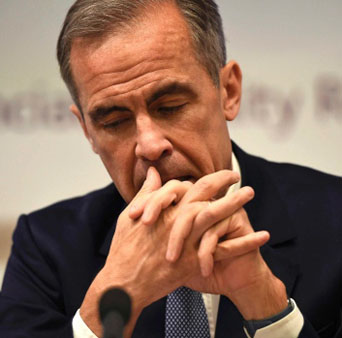“Primary cause of Brexit is first-past-the-post” – Canadian committee on electoral reform take note
Jul 6th, 2016 | By Citizen X | Category: In Brief

Bank of England governor Mark Carney speaks during a news conference at the Bank of England in London, Tuesday, July 5, 2016. (Dylan Martinez/ Pool via AP).
TORONTO, CANADA. JULY 6, 2016. Try as it will, our local and regional universe doesn’t quite seem able to escape altogether from the ongoing Brexit crisis in the United Kingdom – enhanced by “nervousness” over recent “weak data from China.”
(See from yesterday, eg : “Wall Street skids as global growth worries resurface” ; “Wall Street dips as investors shed risk” ; “Mark Carney warns financial shock from Brexit crystallizing as Bank of England eases bank rules in ‘major change’” ; and “Wall Street Turns Defensive as Brexit Woes Get Rekindled on BOE Action.”)
Meanwhile, to cite the latest communication from our own counterweights editors, “such present-day instruments of an esteemed old intellectual tradition as the London Review of Books” continue to  show “evidence that whatever the politicians may finally do will at least be accompanied by a lot of highly literate and even amusing written commentary.”
Yesterday the LRB emailed subscribers a digital version of a key feature from its upcoming 14 July 2016 print edition, called “Where are we now? … Responses to the Referendum.” This includes short pieces from 21 different alleged authorities or persons of interest – from  Neal Ascherson and James Butler, all the way to Wolfgang Streeck and Daniel Trilling, in alphabetical order. Very quickly, here are half a dozen examples :’
(1) “The battle of Brexit came about not because of any serious demand for national change but for the reasons that the Wars of the Roses came about: a power vendetta within a tiny group of privileged men, which they managed to spread beyond their own followers to huge numbers of discontented subjects as if it were their own quarrel.” (Neal Ascherson, Scottish journalist and writer, described by historian Eric Hobsbawm as “perhaps the most brilliant student I ever had.”)
(2) “The Leave vote in England and Wales, with its unmistakable working-class character, including elements of dangerous rudderless vindictiveness, ought to have presented a movement of the left with a challenge and opportunity.” (T.J. Clark, Marxist art historian and writer from Bristol, England, with teaching track record at Harvard and UC Berkeley in the USA.)
(3) “‘The story of the referendum,’ a friend wrote to me this week, ‘is one of people taking a joke too seriously.’ … Â As a passionate Remainer I’m trying to accept the result with good grace but it’s hard when it was brought about by a campaign eloquently described by Robert Harris as ‘the most depressing, divisive, duplicitous political event of my lifetime’.” (Jonathan Coe, English novelist and writer, author of Humphrey Bogart biography.)
(4) “Measured by how people would have voted in the 1990s, the referendum was won and lost by half the Conservative and half the Labour Party each: won by the nationalist-patriotic right allied with its traditional class enemy, the working-class left; lost by the libertarian globalist right allied to the liberal globalist left … We also have confirmation that people don’t object to being lied to, as long as they like the lie.” Â (James Meek, British novelist and journalist, author of The People’s Act of Love, born in London, England and grew up in Scotland.)
(5) “Profoundly anti-democratic and anti-constitutional, the EU obliges you to leave by the only act it recognises: the referendum, which can be ignored as a snap decision you didn’t really mean. If you are to go ahead, it must be by your own constitutional machinery: crown, parliament and people; election, debate and statute. This will take time and deliberation, which is the way decisions of any magnitude should be taken.” … Â (J.G.A. Pocock, English-born, New Zealand-raised historian of political thought, and a tenured professor at Johns Hopkins University in Baltimore since 1975.)
(6) “The primary cause of this referendum result is the first-past-the-post system … It empowered Cameron to take a huge gamble … Â It forced the entire Labour movement to line up behind a leader who was not competent to lead them. It wiped out the Lib Dems … Proportional representation is usually dressed up as an issue of fairness …. But there is a better argument: it is a matter of basic security against misrule by careless and cavalier politicians.” Â (David Runciman, Head of the Department of Politics and International Studies at Cambridge University and “heir to his family’s Viscountcy.”)
The members of Canada’s new “special parliamentary committee on electoral reform” might want to pay special attention to David Runciman’s verdict on proportional representation here.
Or, how the first-past-the-post system misled UK PM David Cameron into calling an especially foolish referendum, the result of which now has “the makings of a full-blown constitutional crisis that the Conservative Party, no matter who becomes its next leader, may struggle to contain.”

Maryam Monsef, Justin Trudeau’s Minister of Democratic Institutions – also involved in electoral reform.
When the Head of the Department of Politics and International Studies at Cambridge is pondering the virtues of proportional representation in quite this way, the notion that the concept is somehow anathema to traditional understandings of parliamentary democracy on the Westminster or British (or even just English?) model can no longer carry much water.
Here as elsewhere, the surprising Brexit referendum result in one of our two old European mother countries just may stimulate the kind of high-minded, constructive debate on the future of Canadian parliamentary democracy that Prime Minister Justin Trudeau has said the promised study of  electoral reform should aspire to. And why not ????





